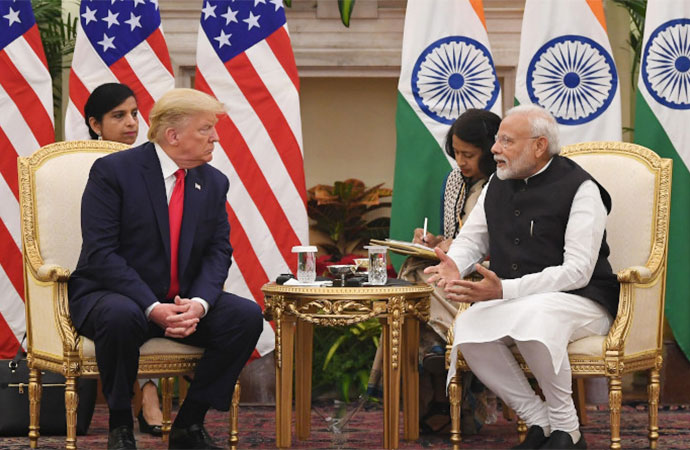Global

Photo: India PM Office
With its deep institutional roots and strategic clarity, the India–US relationship is well-positioned to advance further, driven not by transient rhetoric but by enduring common purpose.
US President Donald Trump's recent assertions about mediating a ceasefire between India and Pakistan have reignited long-standing apprehensions surrounding external involvement in the Kashmir dispute. His remarks, including those referenced during a US court hearing in May 2025-where US Commerce Secretary Howard Lutnick testified that the Trump administration's trade policies helped avert a potential nuclear confrontation in South Asia-were met with widespread criticism from strategic experts and policymakers alike. India has remained steadfast in its position: the issue of Jammu and Kashmir is strictly bilateral and not subject to international mediation.
Despite Trump's controversial rhetoric, the India-US relationship has matured well beyond the influence of individual leaders. It now stands as a robust, multi-dimensional partnership, underpinned by shared strategic interests, deepening economic ties, and strong people-to-people linkages. This is particularly evident through the vibrant Indian diaspora in the United States, which numbers over four million and is among the most educated and affluent immigrant communities in the country.
The diaspora's clout in US policymaking has grown remarkably. A striking example of this influence was witnessed during the COVID-19 crisis in 2021. At a critical juncture, when the Biden administration had imposed export restrictions on essential medical supplies, Indian-Americans mounted an organized lobbying campaign. Their efforts succeeded in convincing the administration to reverse the ban and dispatch critical medical equipment and raw materials for vaccines to India. This intervention demonstrated the community's capacity to influence key policy decisions at the highest levels. Their role is not limited to crisis management. The Indian-American community has been instrumental in advancing landmark initiatives such as the US-India civil nuclear agreement, and today, many Indian-Americans serve in influential roles within the US government. This diaspora acts as a cultural and strategic bridge, enhancing bilateral understanding and reinforcing long-term cooperation.
The evolving India-US partnership is bolstered by a diverse and committed set of stakeholders, including government institutions, private enterprises, think tanks, academic bodies, and civil society in both nations. Crucially, US institutions such as the State Department and Congress continue to regard India as a vital strategic partner, particularly in the context of the Indo-Pacific strategy and broader efforts to counterbalance China's growing regional influence. These institutions take a long-term, bipartisan approach to India-US relations, one that is grounded in continuity and strategic alignment rather than reactive or transactional impulses, such as those reflected in Trump's past pronouncements.
Trump's leadership style has often been described as transactional, business-oriented, and self-promoting. He frequently projects himself as a master negotiator and dealmaker, but many of his actions suggest otherwise. His tendency to prematurely claim success and take credit has often weakened his own negotiating position, whether in the context of Ukraine, North Korea, or South Asia. For instance, Trump repeatedly announced breakthroughs in negotiations between Russia and Ukraine that never materialized, thereby undermining the credibility of such diplomatic efforts.
In the case of India and Pakistan, Trump's attempt to "hyphenate" the relationship-suggesting he could broker a deal between both nations-ignored the decades-long efforts by previous US administrations to de-hyphenate the ties and treat each relationship on its own strategic merits. His statement that "they've been fighting for 1,500 years" reveals a superficial understanding of South Asian geopolitics and history. Such remarks reflect a lack of diplomatic nuance and strategic depth.
In contrast, previous US presidents devoted sustained efforts toward cultivating strategic trust with India-especially in light of their fraught Cold War history and the lingering presence of anti-American sentiment within Indian political and intellectual circles. During this era, American foreign policy toward India embodied a form of strategic altruism, emphasizing long-term engagement grounded in mutual respect rather than immediate concessions or gains. Successive administrations-Republican and Democratic alike, including Trump's own during his first term-recognized the importance of winning India's trust, acknowledging its historic skepticism of US intentions and its adherence to a non-aligned foreign policy stance.
These efforts bore fruit in the form of landmark agreements and growing strategic alignment across a broad spectrum of areas, including defense cooperation, civil nuclear energy, high technology, artificial intelligence, cybersecurity, and counterterrorism. The cumulative effect of these developments has been the deep institutionalization of the India-US partnership, elevating it to the status of a major strategic pillar in the 21st-century global order.
While Trump's erratic rhetoric may generate headlines, it is critical not to exaggerate its impact on this deeply rooted relationship. His habitual tendency to seek the spotlight and amplify his personal role in global diplomacy often lacked substantive backing or long-term vision. By contrast, the India-US partnership rests on far more stable foundations: democratic values, converging geopolitical interests, and well-established institutional mechanisms that safeguard continuity and progress.
In essence, the resilience of India-US relations lies in its insulation from the whims of individual political figures. It is shaped by enduring strategic imperatives and shared long-term goals, rather than by the performative actions of any one leader. Although the partnership has encountered challenges along the way, it has continued to mature and expand-demonstrating an extraordinary capacity to rise above political theatrics and short-term disruptions.
Today, the India-US relationship stands as a source of mutual optimism, reflecting decades of deliberate effort and vision. It is supported by a strong institutional framework, a wide spectrum of stakeholders, and a foundation of mutual trust and strategic convergence. While President Trump's remarks may have introduced momentary uncertainty, they lacked the substance or influence to undermine the core of this multi-dimensional and future-oriented partnership. With its deep institutional roots and strategic clarity, the India-US relationship is well-positioned to advance further, driven not by transient rhetoric but by enduring common purpose.
Dr. Imran Khurshid is an Associate Research Fellow at the International Centre for Peace Studies (ICPS), New Delhi. He specializes in India-US relations, Indo-Pacific studies, and South Asian security issues.

























Leave a Comment
Recent Posts
Right On Schedule
The most eagerly anticipated, and frankly hyped up, announcement of an ...
Fighting raged along the borde ...
Fighting raged along the border of Cambodia and Thailand, with explosi ...
ICIMOD drives regional cooperation to inspire new mo ..
The Cage of Captivity and the Cry for Freedom: A Cru ..
Why Japan issued an advisory for a possible megaquak ..
The Autocrats’ War on Universities